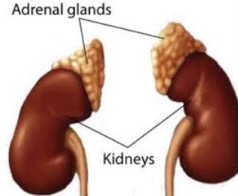“I’m taking a supplement for adrenal support.”
“My doctor told me my adrenals are shot.”
“I wrecked my adrenal gland over the past years.”
Too often I hear doctors describe, and individuals believe, story-lines that are frankly wrong. These cliché narratives attempt to offer a simple “reason” that makes sense out of a set of symptoms such as fatigue, pains and otherwise inexplicable experiences. But when a myth demonizes the most resilient organ in the body, I must challenge preconceived biases and beliefs and offer a truer approach.
Our body is not a set of gaskets and valves that blow out due to additional pressure. Rather, to every challenge we experience our body has a compensatory response that brilliantly moves us toward tolerance and balance. I fully realize that our human response to stress is more in keeping with a world that existed ten thousand years ago—near the close of the stone age for those who are counting. It’s only 2500 generations back from you though. And I promise, if you had ancestors who had “weak adrenals”—during this long era of starvation and physical challenge—they would not have ever made it long enough to pass on their genes.
Your adrenal gland produces several hormones:
 DHEA – which is the upstream “precursor-hormone” that has its own anabolic effects, but can also be modified in the body to produce the sex and steroid hormones.
DHEA – which is the upstream “precursor-hormone” that has its own anabolic effects, but can also be modified in the body to produce the sex and steroid hormones.- Cortisol – Your body responds to all stress – like stacking a lot of wood in a day – by producing this anti-inflammatory reparative hormone. Cortisol also elevates when in a starvation state to help release glucose through a coexisting hormone called glucagon.
- Aldosterone – You likely have not heard much about this hormone but let me summarize its action as “maintaining critical mineral balance in circulation”.
- Epinephrine and Norepinephrine – collectively referred to as adrenaline. These cool proteins are not true hormones and are thus differently named neurotransmitters. They create the “fight-or-flight” response that can rev through our body within a split second in response to a stressor or perceived unpleasantly. The agitation we feel “under stress” is typically caused by these quick compounds but realize so many others things are happening to balance out this survival physiology.
If you carry as much skepticism as I do, you should be asking, “But how do you know it isn’t my adrenals?”
Angling from the perspective of ancestral evolution, I‘m confident that our adrenal gland is the most resilient and persistent endocrine gland in our body. But I don’t want to be another doc making up a narrative to fit what I already believe. I therefore run lab tests to assess some of the hormones mentioned above.
[A note to practitioners: Saliva testing is an adequate screening test for cortisol, but it is not diagnostic. And other hormones like DHEA are far inaccurate quantitatively in saliva.]
Blood tests used to be quite expensive, in 1995 I remember a single testosterone test costing over $250. The panel I now use includes a test of cortisol, DHEA, total and free testosterone for under $100. It is found here.
The test needs to be drawn in the early morning hours – within the first 3 hours from getting out of bed. Therefore, the panel can be added to any fasting metabolic test panel or morning thyroid test done before breakfast. The full menu of Blood Code tests is here and can be done in most places in the U.S.
In my 23 years of experience, I have heard thousands of individuals state they think their adrenal is the problem. Clinically though, I’ve identified adrenal insufficiency and direct adrenal problems in about three cases during this timeframe. That’s less than a 0.1% chance that what people believe about their adrenals is true.
I quoted Mark Twain to introduce a chapter in The Blood Code, “It ain’t what you don’t know that gets you into trouble. It’s what you know for sure that just ain’t so.” So what is wrong if not adrenal? It could be a nutritional deficit, such as B12 or ferritin or inadequate protein intake or over-exertion/under-recovery. It could be insulin resistance that needs correction with a radically different diet. My goal is to find an actionable solution to address the true issue to restore vibrant health, rather than going along with the convenient myth.
PaleoFX published an earlier work about how the thyroid gland was made a fall-guy similar to adrenal glands – you can read that article here if you’re interested.
Curiously yours,
-Richard Maurer, ND



Comments are closed.